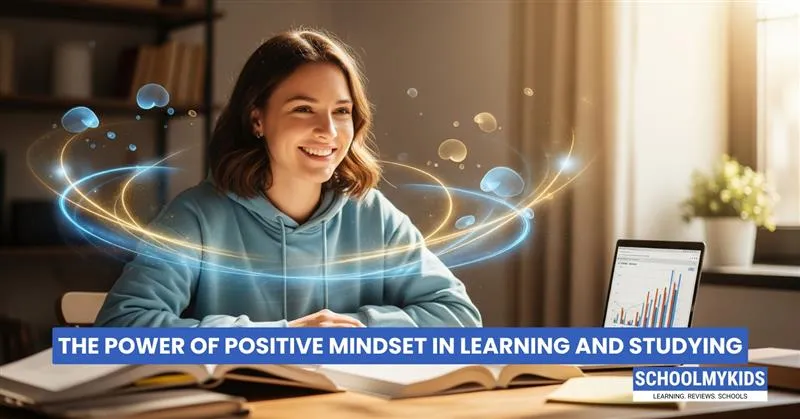It's 10 PM, your textbook is open in front of you, and you've read the same paragraph five times. Nothing's sticking. Your brain feels like mush, your confidence is fired, and that voice in your head keeps saying, "I'm just not smart enough for this."
If you're nodding your head right now, you're not alone. Every single student, from middle school to college, has been exactly where you are. That feeling of being stuck, overwhelmed, or ready to give up is normal. However, your mindset about learning can make all the difference between remaining stuck and breaking through.
Why Your Mindset Is Your Secret Weapon
Think of your brain like a garden. When you plant seeds of "I can't do this" or "I'm terrible at math," those thoughts grow into weeds that choke out your potential. But when you plant seeds of "I can figure this out" or "I'm getting better every day," you're growing flowers that help your brain bloom.
Your mindset isn't just feel-good fluff; it's backed by real science. When you approach learning with a positive attitude, your brain functions more effectively. Here's what happens:
- Your focus gets sharper: Instead of your mind wandering to all the things you can't do, you zone in on what you're learning right now.
- Your memory improves: When you're relaxed and confident, your brain stores information more effectively. Stress and negative thoughts actually block your ability to remember things.
- You become a better problem-solver: A positive mindset opens up your creativity. You start seeing multiple ways to tackle a challenge instead of hitting a wall.
It's like upgrading your brain's operating system. Same brain, better performance.
What Does a Positive Learning Mindset Actually Look Like?
Let's clear something up right away: having a positive mindset doesn't mean walking around with a fake smile, pretending everything's easy. That's not realistic, and it can get really annoying.
A real positive learning mindset looks like this:
- You see challenges as puzzles to solve, not walls to hit: When you encounter something difficult, your first thought isn't "I can't do this." Instead, you think, "Okay, what's the best way to figure this out?"
- You celebrate small wins: Got one math problem right after struggling with ten? That's worth celebrating. Progress is progress, no matter how small.
- You talk to yourself like you'd talk to your best friend: Instead of "I'm so stupid," you say, "That was tough, but I'll get it with more practice."
- You see effort as the path to getting smarter: You understand that struggling doesn't mean you're not smart, it means you're growing.
- You bounce back from setbacks faster: A bad grade doesn't mean you're a failure. It means you have specific things to work on.
How to Build Your Positive Learning Mindset?
1. Master the Art of Self-Talk Makeover
The voice in your head is either your biggest cheerleader or your worst enemy. Time to make it your friend.
How to Do It: Catch yourself when you think negative thoughts about your abilities. Don't just ignore them – replace them. Instead of "I'm terrible at science," try "I'm still learning science." Instead of "I always mess up," try "I made a mistake, and now I know what to work on."
Why it works: Your brain believes what you tell it repeatedly. If you keep saying you're bad at something, your brain will look for evidence to prove you right. Flip the script, and your brain starts looking for evidence of your progress instead.
This might sound crazy, but mistakes are actually treasure chests full of learning opportunities. The students who improve the fastest are the ones who get excited about their mistakes.
How to Do It: When you get something wrong, don't just look at the right answer and move on. Ask yourself three questions: What did I do? Why didn't it work? What should I do differently next time? Write these down if it helps.
Why it works: Mistakes show you exactly where your knowledge has gaps. Instead of feeling embarrassed, you can feel like a detective who just found an important clue.
3. Use the Power of "Yet"
One tiny word can completely change how you feel about learning: "yet."
How to Do It: Add "yet" to any statement about what you can't do. "I don't understand algebra" becomes "I don't understand algebra yet." "I can't write good essays" becomes "I can't write good essays yet."
Why it works: That little word reminds your brain that abilities aren't fixed. You might not be able to do something right now, but that's temporary.
4. Create a Progress Journal
Most students only notice what they don't know. A progress journal helps you see how much you're actually learning.
How to Do It: At the end of each study session, write down one thing you learned, one thing you improved at, and one thing you want to work on tomorrow. Keep it simple, just a sentence or two for each.
Why it works: Your brain needs evidence of progress to stay motivated. This journal becomes your proof that you're moving forward, even when it doesn't feel like it.
5. Break Big Scary Tasks into Tiny Wins
Nothing kills motivation faster than looking at a huge project or a mountain of material to learn. Your brain sees it and basically says, "Nope, too big, let's watch reels instead."
How to Do It: Take any big task and break it into pieces so small they feel almost silly to write down. Instead of "study for history exam," try "read pages 50-55," then "make flashcards for chapter 3," then "practice timeline for 15 minutes."
Why it works: Your brain loves checking things off lists. Each small completed task gives you a hit of accomplishment that motivates you to tackle the next small task.
6. Find Your Study Buddy (Even If It's Yourself)
Learning doesn't have to be a solo mission. Sometimes the best way to stay positive is to have someone in your corner.
How to Do It: Find a study partner, join a study group, or even just explain what you're learning to a family member or pet. If you're studying alone, try explaining concepts out loud to yourself.
Why it works: When you explain something to someone else, you realize how much you actually know. Plus, struggling together feels way less lonely than struggling alone.
Conlusion
You're going to face challenges in learning. There will be subjects that make you want to bang your head against the wall. There will be days when you feel like everyone else gets it and you don't.
But every expert in every field started exactly where you are now. The difference isn't that they were naturally smarter. The difference is that they chose to see challenges as chances to grow instead of proof that they weren't good enough.
Your positive mindset isn't just about feeling better (though that's a nice bonus). It's about unlocking your brain's full potential. It's about turning study sessions from a chore into a treasure hunt. It's about building confidence that reaches way beyond the classroom.









Be the first one to comment on this story.